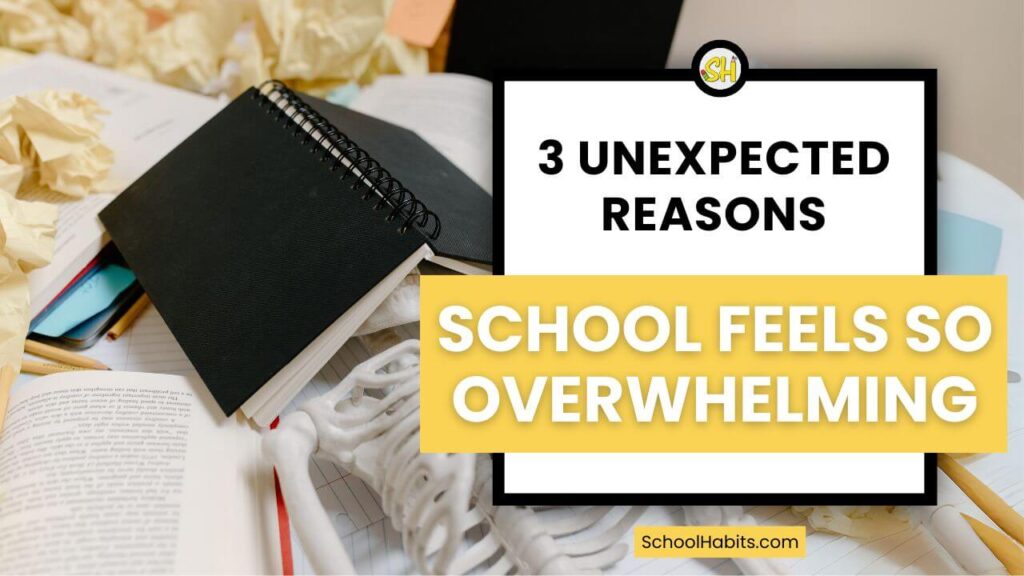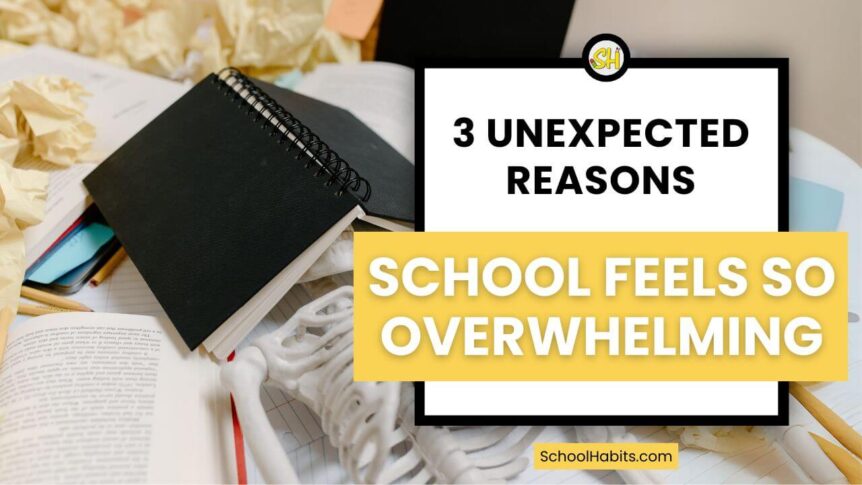
By Katie Azevedo, M.Ed.
School can feel overwhelming for a million reasons, most of which have to do with the fact that school is hard. I’m dead serious. AP physics can feel challenging because AP physics is challenging. Advanced economics can feel difficult because advanced economics is difficult.
But this post isn’t about difficult classes. It’s about 3 unexpected reasons school feels so overwhelming, even when the content itself isn’t the problem.
Note: I’ve written a similar-ish blog post before, titled 7 Invisible Traps that Make School Feel Impossible. However, those seven reasons have to do with school itself. It’s important to understand how those areas might also be at play, so read that post when you’re done here.
3 Unexpected Reasons School Feels So Overwhelming (That Have Nothing to Do with the Work Itself)
No matter how smart you are, school can feel so much harder than it really is if any of the following three areas affect you. So let’s break down these three unexpected reasons school feels so overwhelming — none of which are about how “hard” your courses are, and all of which are fixable.
1. Emotional Dysregulation
No one likes hearing this, but school feels harder if you lack emotional regulation, take things personally, or blame teachers and environments for everything that goes wrong.
If you have ADHD, emotional dysregulation kind of just comes with the territory. But even people without ADHD can struggle to control their emotions during periods of high stress and discomfort.
What is emotional regulation? Emotional regulation is the ability to feel our feelings without letting them hijack our behaviors. It’s fine if we feel angry, but staying regulated means we don’t yell or lash out. It’s fine if we feel resentful toward someone, but staying regulated means we don’t act on that resentment.
If you lack emotional regulation, you’re also more likely to blame teachers for bad test grades and blame the content for being hard.
If you lack emotional regulation, you’re also more likely to take things personally. I often hear students say, “The teacher just doesn’t like me,” or “The teacher was mad at me, so they gave me a bad grade.”
Let me tell you something: having been a teacher for 20 years, I can report that we don’t get mad at students and we don’t not like students. That would be weird. There are definitely kids who are more challenging, but on a human level, we don’t have these kinds of feelings toward our students.
The problem with being emotionally dysregulated is that it prevents you from ever being able to make changes that improve your situation.
If you always think it’s the teacher’s fault for making a hard test, then you’ll never be open to evaluating your study methods and finally using ones that work.
If you always think that it’s the content’s fault for being hard, then you’ll never learn strategies for doing hard things.
If you’re always blaming school for giving you so much work, then it will never occur to you that a few tweaks to your time management system could literally change your entire school experience and make everything easier.
The first strategy in emotional regulation is to recognize that you’re dysregulated in the moment.
This can be hard to do. When you’re in the middle of a panic episode about how unfair your teacher is, it’s hard to pause and say to yourself, “Gee, I think I’m emotionally regulated.”
But that’s what you have to do. When you’re freaking out, take a pause. Step away from the situation. Take some breaths. Go for a walk. Put distance between yourself and the event that triggered you.
Next, ask yourself, What can I do in this situation?
Your inner voice might tell you, “Nothing! It’s all the teacher’s fault!” And this is normal at first. But return to the question: What can I do in this situation? If you don’t ever ask yourself this question, you’ll never find the answer. And the answer is how you become emotionally regulated and better at school.
2. Not Knowing How to Do School
Let me describe a completely absurd situation. Imagine you’re told to go on stage and play Mozart on the piano. Everyone is yelling at you, “Just play it! Why can’t you play it? You have to play it!”
But let’s say in this scenario, you have never been taught how to play the piano. You’re being told TO play, but never taught HOW.
Well then, good luck on stage!
Of course that scenario is absurd. But it’s the exact same thing that happens in school. You’re told to study vocabulary but not taught how. You’re told to study for Thursday’s test, but never shown study strategies. Scolded to manage your time better… but that is literally the most abstract command ever. Like, what does that even mean?
Being expected to DO school without ever being taught HOW to do school is just as absurd as being told to play Mozart on the piano without ever being taught how to play the piano.
I can’t even tell you how many students inside SchoolHabits University came into the program thinking school was so hard. Impossible, even. “I’m just bad at math,” or “It takes me forever to read,” they would tell me. But after just a few weeks of learning how to learn, these students are shocked at how much easier their content becomes.
Said differently, it’s not the vocabulary word that’s hard. It’s just a word. But that word becomes nearly impossible if you don’t know how to move that word from outside your brain to inside your brain in a way that you won’t forget it the next day.
So what’s the solution? Learn how to do school.
This is exactly what I teach inside SchoolHabits University. That’s my online, self-paced course that teaches the strategies I’ve taught to thousands of students: Time management, task management, note-taking, annotating, study skills, and organization… and how they all work together to make school easier and your grades better. Learn more about the program here.
3. Mental Fatigue and Cognitive Overload
Everybody knows that stress and bad sleep impact performance. That’s why you’re told to get a good night’s sleep before a big game and you’re told to relax before a high-stakes performance.
But what people often ignore is the chronic cognitive overload that you feel as a student.
Constant distractions, poor sleep, and anxiety lead to a depleted brain, and a depleted brain perceives anything as harder, even simple tasks. (Scientifically, a stressed-out brain can’t learn.)
The sneaky thing about mental fatigue is that it creeps up on you. You may be taking a semester of hard courses at the same time you signed up for a new club, at the same time you started a babysitting job on the weekends. Individually, those are all excellent activities. But collectively, they may be contributing to your sense that school is harder than it needs to be.
Everything we say yes to comes with invisible administration tasks that we don’t think about. These are exhausting to us, even though we don’t even think about them.
Factor together these invisible administration tasks, your sleep deprivation due to late-night studying and procrastination, stress about your grades, anxiety about your work schedule, and your general dread about not having enough time to do it all, and you’re looking at a perfect recipe for cognitive overload and collapse.
Doing more is not always better. Just because you can fit an activity in your calendar doesn’t mean you have the time for it. If school feels harder than it should, and you have all of your “how to do school” systems dialed in (doubtful, unless you’re a student inside SchoolHabits University), it could be because you’re simply doing too much and are not aware of it.
Final Notes About Why School Feels Hard
Here’s the thing that not a lot of people talk about: school is hard. Think about it: anytime you do something for the first time, it can feel hard. And practically every single day at school, you’re doing something for the first time. So yes, school is hard.
But getting a handle on your emotional regulation, your school and study skills, and your stress levels can make school feel 1000 times easier.
Students who refuse to change their approach to school are the ones who stay victims forever. They’re the ones who move through college and eventually careers, blaming professors and eventually bosses for things that they actually have complete control over. I want better for you.
Seriously consider the three areas I outlined in this post. And if any of these unexpected reasons school feels so overwhelming resonated with you, come join me inside SchoolHabits University, which gives you the fastest route to making everything about school easier.

